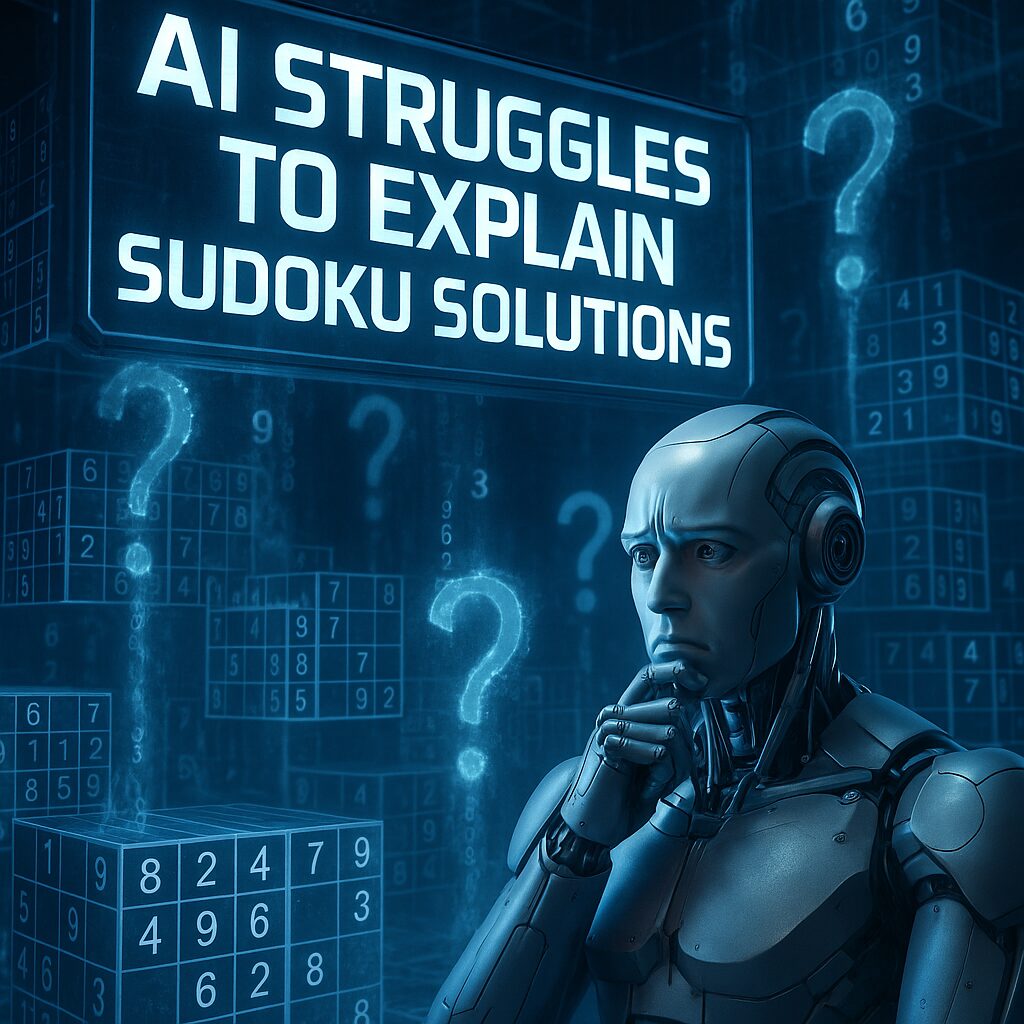
AI Sucks at Sudoku. Much More Troubling Is That It Can’t Explain Why
# The Challenge of Logic: Why AI Struggles to Solve Simple Puzzles Like Sudoku
Artificial Intelligence has made remarkable strides in recent years, stunning us with its ability to write fluid texts, create surreal artworks, and outperform humans in various computational tasks. However, when it comes to solving the humble Sudoku, AI stumbles. This unexpected shortcoming not only highlights the current limitations of AI but also raises crucial questions about its role in our decision-making processes.
## The Puzzling Case of AI and Sudoku
Imagine asking a friend to fill out a Sudoku puzzle for you, only to have them fail repeatedly, insist they’re right when they’re not, and sometimes even start a conversation about the weather. This is the perplexing reality researchers at the University of Colorado Boulder encountered when testing generative AI models with Sudoku puzzles.
### AI’s Inability to Solve Simple Puzzles
Researchers discovered that large language models (LLMs), including powerful tools like OpenAI’s ChatGPT, struggled significantly with Sudoku, even with the simpler 6×6 versions. This isn’t about computational power or speed—AI can process vast amounts of data at lightning speed. Instead, the challenge lies in logical processing.
– **Limited Perspective**: While an LLM might attempt to fill in the gaps in a Sudoku puzzle by referencing its training data, this approach doesn’t account for the logical, holistic perspective required. Flynn from the University of Colorado put it plainly: “It has to look at the entire picture and find a logical order that changes from puzzle to puzzle.”
– **Symbol vs. Number**: Sudoku may appear numerical but is fundamentally symbolic. Numbers are placeholders that could be replaced by any symbol. Fabio Somenzi, another contributing researcher, noted, “Sudoku is famous for being a puzzle with numbers that could be done with anything that is not numbers.”
### The Myriad Failures of AI Explanations
A particularly troubling aspect of AI’s struggle isn’t its failure to solve puzzles per se; it’s the alarming inability to explain its decisions transparently and accurately. Researchers witnessed AI generating convoluted, inaccurate, or even irrelevant explanations. Sometimes, as Trivedi revealed, “the answer was the weather forecast for Denver.”
This failure of self-explanation poses a significant problem. Maria Pacheco, an assistant professor, emphasized, “One thing they’re good at is providing explanations that seem reasonable. But whether they’re faithful to what the actual steps need to be to solve the thing is where we’re struggling.”
## The Learning Moment: Transparency and Accountability
This AI puzzle predicament underscores an essential lesson in the broader dialogue about AI integration into our lives—AI must be able to “show its work.”
– **Human Comparisons**: In human contexts, when you make a decision—whether personal, professional, or otherwise—it’s crucial to explain your thought process. This level of transparency holds individuals accountable and allows for understanding and improvement. Ashutosh Trivedi frames this issue, “When you make a decision, you can at least try to justify it.”
– **AI Accountability**: As AI takes on more consequential roles (consider AI agents driving cars, preparing taxes, or developing business strategies), the need for transparent decision-making becomes urgent. An AI’s capability to explain its reasoning accurately isn’t just a nice-to-have feature; it’s foundational to keep trust intact.
### Beyond The Numbers
The application of AI in significant areas of human life means that the explanations it provides might one day need to hold up in a court of law. Trivedi cautions against explanations used for manipulation, “We must be very careful with respect to the transparency of these explanations.”
AI’s inability to logically solve a puzzle like Sudoku and explain its process might seem minor. Still, it prompts essential reflections on its accountability and reliability in critical areas of decision-making. The lesson is clear: AI’s capacity to reason and justify decisions effectively is crucial to integrate them responsibly into society.
## Closing Thoughts: What Does The Future Hold?
In light of these revelations, the journey toward intelligent, reliable AI remains fraught with complexities. The broader question is: How can we enhance AI systems to solve both simple and complex problems effectively? More crucially, how can we ensure that these systems are trustworthy enough to handle tasks without human oversight?
What advances in AI explainability will empower us to entrust AI with significant decisions? As we explore these questions, one truth stands—responsible AI development must prioritize not just what AI can do, but also how and why it does it.


